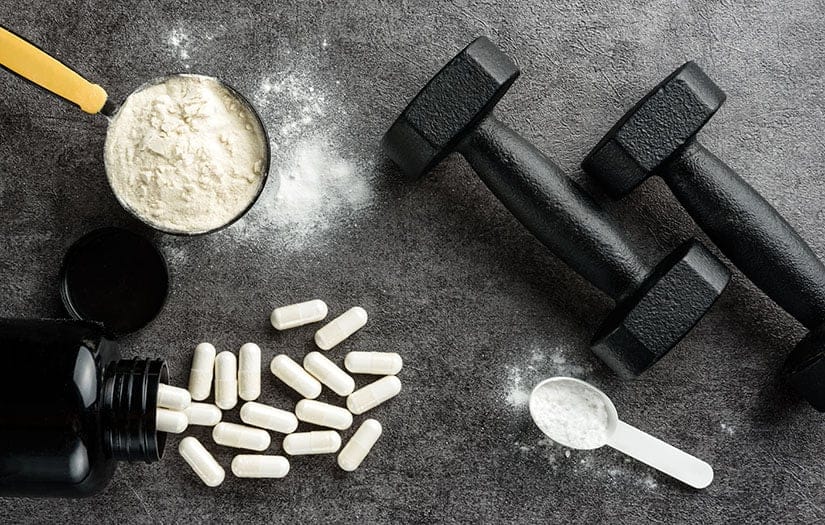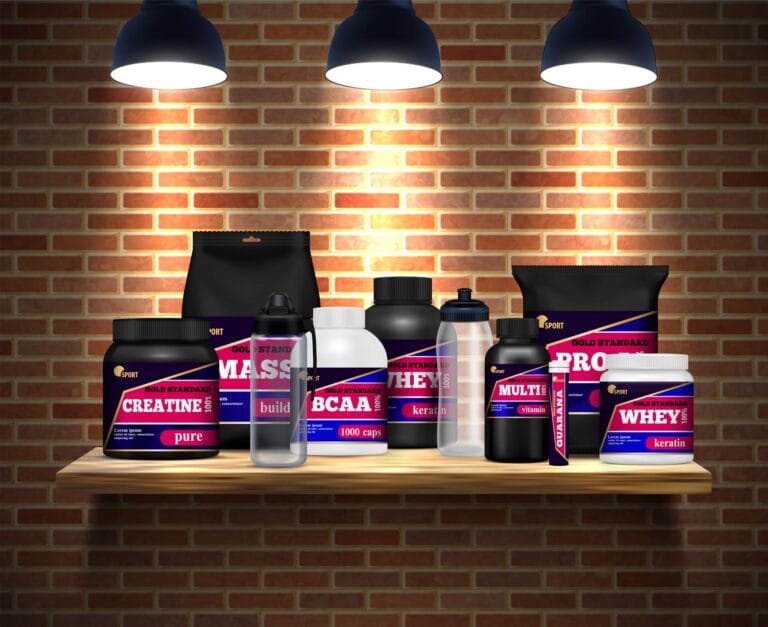Top 10 Supplements for Muscle Growth in Ectomorphs
Introduction

Ectomorphs often struggle to pack on muscle mass, but the right supplements can make a significant difference. For those looking to build strength and size, finding the best supplements for muscle growth is crucial. These powerful aids can boost protein synthesis, enhance recovery, and provide the energy needed for intense workouts.
Whey protein and creatine monohydrate top the list of essential supplements for ectomorphs aiming to gain muscle. Amino acids, including BCAAs and glutamine, play a vital role in muscle recovery and growth. Pre-workout supplements containing caffeine can give the energy boost needed for strength training sessions. Fish oil supports overall health and muscle function. This article explores the top 10 supplements that can help ectomorphs in their bodybuilding journey, offering insights into how each can contribute to achieving their muscle growth goals.
Protein Powders for Muscle Growth

Protein powders are essential supplements for muscle growth, especially for ectomorphs who often struggle to pack on muscle mass. These powders provide a concentrated source of high-quality protein, which is crucial for muscle repair, recovery, and growth after intense workouts.
Types of protein powders
Several types of protein powders are available, each with unique characteristics:
- Whey Protein: This water-soluble milk protein is the most popular among athletes. It’s a complete protein, containing all essential amino acids, and the body absorbs it quickly and easily. Whey protein comes in two main forms:
- Whey Concentrate: The most basic and affordable form, containing around 80% protein.
- Whey Isolate: A more refined form with approximately 90% protein content.
- Casein: Another milk-derived protein, casein is rich in glutamine, an amino acid that may speed up muscle recovery. The body digests it more slowly, making it ideal for nighttime consumption.
- Soy Protein: An excellent alternative for those who don’t consume dairy, soy protein contains all essential amino acids.
- Pea Protein: A high-quality plant-based option, pea protein is rich in arginine, an important amino acid for muscle growth.
- Hemp Protein: Made from hemp seeds, this complete protein also contains essential fatty acids, making it a good choice for vegans or those with dairy or soy allergies.
Benefits for ectomorphs
Protein powders offer several advantages for ectomorphs aiming to build muscle:
- Increased Protein Intake: Ectomorphs typically need to consume more calories and protein than other body types to gain muscle. Protein powders provide an easy way to increase protein intake without excessive calories.
- Convenience: For ectomorphs with high metabolisms, frequent meals are often necessary. Protein shakes offer a quick and portable option to meet increased nutritional needs.
- Muscle Protein Synthesis: Protein powders, especially those rich in leucine (like whey), can stimulate muscle protein synthesis, the primary driver of muscle repair and growth.
- Recovery Support: Fast-absorbing proteins like whey can help kickstart the recovery process immediately after workouts.
Recommended dosage
The optimal protein intake for muscle growth is generally between 1.2 and 1.6 grams per kilogram of body weight daily. For a 180-pound (81.8 kg) individual, this translates to 98-131 grams of protein per day. Protein powders can help meet this requirement, especially when whole food sources are insufficient.
A typical serving of protein powder provides 20-30 grams of protein. For muscle gain, it’s recommended to consume protein at regular intervals throughout the day, with a serving within an hour after workouts to support recovery and growth.
While protein powders are beneficial, they should complement a balanced diet rather than replace whole food protein sources. Ectomorphs should aim to consume a variety of protein-rich foods alongside their supplement regimen for optimal muscle growth and overall health.
Creatine for Strength and Size

Creatine monohydrate stands out as one of the most effective supplements for muscle growth and strength enhancement, particularly beneficial for ectomorphs. This naturally occurring compound plays a crucial role in energy production within muscle cells, making it a popular choice among athletes and bodybuilders.
How creatine works
Creatine functions as an essential intermediate in muscle metabolism, primarily by increasing the phosphocreatine/creatine ratio in skeletal muscle tissue. This increase enhances the capacity for rapid adenosine triphosphate (ATP) resynthesis during high-intensity exercises. The ATP-CP system, also known as the phosphagen system, is the fastest method of supplying ATP for skeletal muscle metabolism, making it particularly effective for short-duration, high-intensity activities.
The supplementation of creatine leads to several beneficial effects:
- Improved anaerobic capacity
- Delayed fatigue onset
- Enhanced muscle protein synthesis
- Increased lean body mass
- Improved recovery between training sessions
These effects result from creatine’s ability to maintain higher intracellular ATP levels for extended periods, allowing athletes to sustain greater training intensity and quality throughout their workouts.
Dosage and timing
For optimal results, creatine supplementation typically follows a loading phase followed by a maintenance phase:
- Loading phase: 20-25 grams per day, divided into 4-5 doses, for 5-7 days
- Maintenance phase: 3-5 grams per day
Some research suggests that a loading phase may not be necessary, and consistent daily intake of 3-5 grams can produce similar results over time. However, the loading phase can lead to faster saturation of muscle creatine stores.
Timing of creatine intake remains a topic of debate among researchers. While some studies suggest potential benefits of post-workout consumption, others find no significant difference in timing. The most crucial factor is consistent daily intake, regardless of the specific timing.
Potential side effects
Creatine is generally considered safe for most individuals when used as directed. However, some potential side effects may include:
- Mild gastrointestinal discomfort
- Water retention
- Muscle cramps
It’s important to note that these side effects are typically mild and often subside as the body adjusts to supplementation. Proper hydration can help mitigate some of these effects.
Individuals with pre-existing kidney or liver conditions should consult a healthcare professional before starting creatine supplementation. Additionally, those with bipolar disorder should exercise caution, as creatine might exacerbate manic symptoms.
In conclusion, creatine monohydrate offers significant benefits for ectomorphs looking to increase strength and muscle size. Its well-established safety profile and effectiveness make it a valuable addition to a comprehensive muscle-building regimen when combined with proper nutrition and resistance training.
BCAAs for Recovery and Endurance

What are BCAAs?
Branched-chain amino acids (BCAAs) are essential amino acids that play a crucial role in muscle metabolism and protein synthesis. They consist of leucine, isoleucine, and valine, accounting for approximately 35% of the essential amino acids in muscle proteins. Unlike other amino acids, BCAAs are primarily metabolized in skeletal muscle rather than the liver, making them particularly important for athletes and bodybuilders.
Benefits for muscle growth
BCAAs offer several benefits for muscle growth and recovery:
- Increased muscle protein synthesis: Leucine, in particular, activates the mTOR pathway, stimulating muscle protein synthesis. Studies have shown that BCAA supplementation can increase muscle protein synthesis by up to 22% compared to a placebo.
- Reduced muscle soreness: BCAA supplementation may help alleviate delayed onset muscle soreness (DOMS) following intense resistance exercise, potentially improving recovery time.
- Decreased fatigue: BCAAs can help reduce exercise-induced fatigue by competing with tryptophan for uptake in the brain, potentially delaying the onset of central fatigue during prolonged exercise.
- Muscle preservation: BCAAs may help prevent muscle wasting, which is particularly beneficial for individuals on low-calorie diets or those engaged in fasted training.
How to supplement
To maximize the benefits of BCAA supplementation:
- Dosage: A typical dosage ranges from 5 to 20 grams per day, taken in divided doses. For muscle enhancement, up to 20 grams daily appears to be safe and effective.
- Timing: BCAAs can be consumed before, during, or after workouts. Some athletes prefer taking them during long endurance events or immediately after resistance training to support recovery.
- Form: BCAAs are available in powder or capsule form. Powder is often preferred for its versatility and ease of mixing with other supplements or beverages.
- Considerations: While BCAA supplements can be beneficial, it’s important to note that a well-balanced diet rich in complete protein sources may provide sufficient BCAAs for most individuals. Supplementation may be most beneficial for those with specific dietary restrictions or high training volumes.
Pre-Workout Supplements for Energy

Pre-workout supplements have gained popularity among fitness enthusiasts and athletes seeking to enhance their exercise performance. These specialized dietary supplements, designed to be consumed before exercise, contain a blend of ingredients aimed at increasing energy, focus, and overall workout effectiveness.
Key ingredients to look for
When selecting a pre-workout supplement, it’s essential to examine the ingredient list carefully. Some of the most common and effective components include:
- Caffeine: As the primary stimulant in most pre-workouts, caffeine enhances energy levels, focus, and reaction time. It stimulates the central nervous system, improving exercise performance and reducing fatigue.
- Beta-alanine: This amino acid helps produce carnosine, which improves muscular endurance and may reduce fatigue during high-intensity exercises.
- Creatine: Known for its ability to increase strength and power, creatine supplies energy to muscles and can enhance overall performance.
- Amino acids: Branched-chain amino acids (BCAAs) and other essential amino acids support muscle growth, reduce damage, and aid in recovery.
- B vitamins: These play crucial roles in energy production and nutrient transport throughout the body.
Benefits for workouts
Pre-workout supplements offer several advantages for those looking to maximize their training sessions:
- Increased energy and focus: The caffeine content provides a significant boost, helping users feel more alert and motivated during workouts.
- Enhanced performance: Ingredients like creatine and beta-alanine can improve strength, power, and endurance, allowing for more intense and productive training sessions.
- Improved blood flow: Some pre-workouts contain ingredients that increase nitric oxide production, enhancing blood flow to muscles and potentially improving performance in high-intensity exercises.
- Faster recovery: The amino acid content in many pre-workouts can help reduce muscle soreness and support faster recovery between training sessions.
Proper usage
To maximize the benefits of pre-workout supplements while minimizing potential side effects, consider the following guidelines:
- Timing: Consume the supplement approximately 20-30 minutes before exercising to allow the ingredients to take effect.
- Dosage: Follow the recommended serving size on the product label. For caffeine, aim for 200 mg or less per serving to avoid potential side effects.
- Consistency: Regular use may lead to better results, as some ingredients build up in the body over time.
- Cycling: To prevent tolerance buildup, consider cycling off pre-workouts periodically or alternating between different products.
- Hydration: Ensure adequate water intake, as some ingredients may have a mild diuretic effect.
While pre-workout supplements can be beneficial, it’s important to remember that they should complement a balanced diet and proper nutrition. Always consult with a healthcare professional before starting any new supplement regimen, especially if you have pre-existing health conditions or are taking medications.
Fish Oil for Overall Health

Fish oil supplements have gained popularity among fitness enthusiasts and bodybuilders due to their potential benefits for muscle growth and overall health. These supplements are rich in omega-3 fatty acids, particularly eicosapentaenoic acid (EPA) and docosahexaenoic acid (DHA), which are essential for various bodily functions.
Omega-3 benefits
Omega-3 fatty acids play crucial roles in supporting cardiovascular, immune, brain, and neuromuscular function. They have been shown to have anti-inflammatory properties, which can be particularly beneficial for athletes and bodybuilders. Some studies suggest that omega-3 supplementation may lead to slight increases in muscle strength, although the impact on muscle mass and function remains inconclusive.
Fish oil has also been associated with potential improvements in joint health, cholesterol balance, and mental well-being. Research indicates that omega-3s may help reduce triglyceride levels and potentially lower the risk of coronary heart disease. Additionally, some studies have found a link between omega-3 consumption and improved brain health, with one study suggesting that regular fish consumption may be associated with reduced memory loss in older adults.
Dosage recommendations
The recommended intake of omega-3s varies depending on age, gender, and specific health conditions. For healthy adults, the National Institutes of Health suggests that males between 19 and 50 years old need 1.6 grams per day, while females of the same age require 1.1 grams. However, for bodybuilding purposes, some studies have used higher doses ranging from 3,000 to 5,000 mg of EPA and DHA combined per day.
Choosing quality fish oil
When selecting a fish oil supplement, it’s crucial to consider the quality and purity of the product. Look for supplements that have been certified as sustainable and follow or exceed the FDA’s Good Manufacturing Practices guidelines. Pay attention to the EPA and DHA levels, as higher concentrations of these omega-3s are generally more beneficial. Some experts recommend choosing supplements that provide omega-3s in the form of free fatty acids, triglycerides, or phospholipids, as these forms are better absorbed by the body.
Conclusion
Supplements play a crucial role in muscle growth for ectomorphs, offering a range of benefits to enhance their bodybuilding journey. From protein powders and creatine to BCAAs and pre-workout formulas, each supplement has a unique impact on muscle development and overall performance. Fish oil also stands out for its contribution to overall health, potentially boosting joint function and cardiovascular well-being.
While supplements can be game-changers, it’s essential to remember they work best when combined with a balanced diet and consistent training routine. To get the most out of these supplements, ectomorphs should pay attention to proper dosages, timing, and quality. By thoughtfully incorporating these supplements into their regimen, ectomorphs can overcome their natural challenges and make significant strides in their muscle-building goals.
FAQs
What supplements are recommended for ectomorphs to enhance muscle growth?
Ectomorphs can benefit significantly from supplements that aid muscle growth. Effective supplements include creatine, whey protein, caffeine, and beta-alanine. These should be used alongside a high-calorie, protein-rich diet to help achieve desired muscle gains.
How can ectomorphs accelerate muscle development?
Ectomorphs should focus on progressive overload, which involves gradually increasing the weight, repetitions, or sets in their workouts. This method helps to continuously challenge the muscles, promoting growth and ensuring ongoing progress.
What dietary strategy should ectomorphs follow to gain muscle?
Ectomorphs aiming to gain muscle should increase their calorie intake by at least 500 calories. It’s advisable to opt for warm foods over cold ones for better digestion. Recommended carbohydrates for ectomorphs include oats, brown rice, quinoa, sweet potatoes, and potatoes.
Which supplement is most effective for rapid muscle growth?
Creatine has been extensively studied and is highly recommended for rapid muscle growth. It helps increase muscle mass within a short period, typically around 4 weeks when following a loading protocol.
What is the best single supplement for increasing muscle size quickly, regardless of health implications?
Steroids are often cited as the most effective means for rapid muscle size increase, although they carry significant health risks and legal implications. It’s important to consider safer and legal alternatives like creatine and protein supplements combined with a structured workout and nutrition plan.






